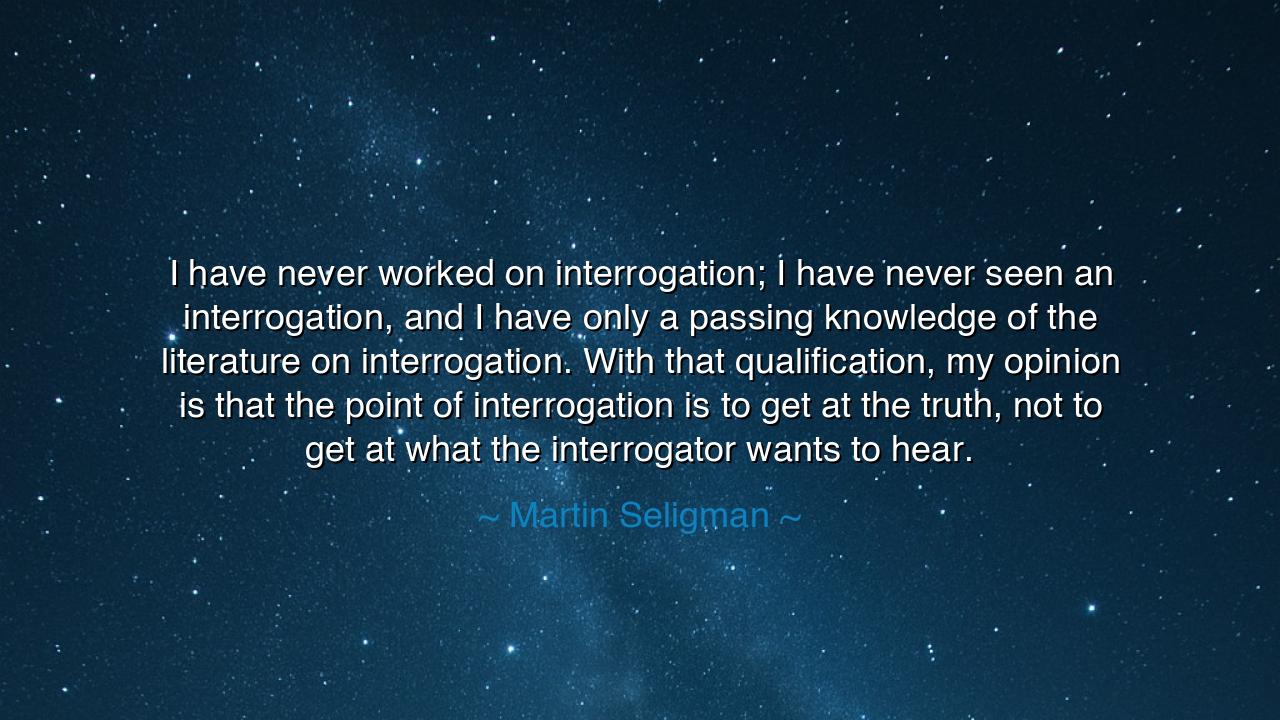
I have never worked on interrogation; I have never seen an
I have never worked on interrogation; I have never seen an interrogation, and I have only a passing knowledge of the literature on interrogation. With that qualification, my opinion is that the point of interrogation is to get at the truth, not to get at what the interrogator wants to hear.






The words of Martin Seligman — “I have never worked on interrogation; I have never seen an interrogation, and I have only a passing knowledge of the literature on interrogation. With that qualification, my opinion is that the point of interrogation is to get at the truth, not to get at what the interrogator wants to hear” — are a rare blend of humility and moral insight. They remind us that even one who stands at a distance from the machinery of power can still discern the essence of justice. In these words lies an eternal lesson: the pursuit of truth must never be corrupted by desire. Whether in the chambers of law, the courts of kings, or the private councils of conscience, the sacred task of questioning — of seeking — is not to confirm one’s bias, but to uncover what is.
In the ancient world, interrogation was not merely an act of inquiry; it was a ritual confrontation between ignorance and truth. The Greeks called it elenchus — the method of Socrates, who questioned not to shame his interlocutors, but to pierce the veil of illusion and draw forth wisdom from within them. The purpose of questioning, as Seligman so rightly declares, is not to extract compliance, but to reveal understanding. The moment an interrogator — or any seeker of truth — begins to demand answers that align with their expectations, the spirit of truth itself flees the room. For truth, like light, cannot dwell where the will has decided in advance what it wishes to see.
There is a deep humility in Seligman’s words — the admission that his own experience with interrogation is limited. Yet this humility is not weakness; it is wisdom. The ancients taught that only those who know they do not know are fit to judge what is true. By declaring his distance from the practice, Seligman makes his insight even purer, for it is free of agenda. He reminds us that truth is not the property of experts, but the inheritance of the honest heart. The wise do not force truth into their shape; they shape themselves to receive it.
Consider the story of Galileo Galilei, who stood before the Inquisition for declaring that the Earth moves around the Sun. His interrogators were not seeking the truth; they were seeking affirmation of doctrine. Their purpose was not discovery, but domination. Galileo’s truth threatened the structure of their belief, and so they silenced him — yet history vindicated him, as it always vindicates those who serve truth rather than authority. Seligman’s words, though spoken in a modern context, echo across the centuries: when interrogation becomes a weapon of control rather than a tool of understanding, it ceases to serve truth and begins to serve fear.
The point of interrogation, Seligman insists, is to get at the truth, not to confirm the interrogator’s expectations. This distinction is not limited to prisons or courts — it extends into every conversation, every relationship, every moment when one human seeks to understand another. Parents question children, leaders question followers, and even the mind questions the heart. If those questions are asked to force a certain answer, no wisdom is gained. But if they are asked in sincerity — to listen, to learn, to uncover — then truth shines forth, pure and untamed. The one who truly listens becomes a mirror of the divine.
History offers another lesson in the form of Nelson Mandela, who spent twenty-seven years behind bars under the scrutiny of his oppressors. His captors interrogated him not to find the truth, but to break his spirit, to make him affirm what they already believed — that he was a criminal, not a man of justice. Yet it was Mandela who emerged freer than they, for he never allowed hatred or deceit to twist his understanding of truth. When he finally walked out of prison, he carried with him the light of integrity — a reminder that even in the darkest interrogation, truth cannot be caged when the heart remains steadfast.
From Seligman’s reflection, a timeless lesson arises: seek truth, not victory. Whether you question others or yourself, do so not to win an argument, but to discover what is right. The one who forces truth to conform to desire is already lost; the one who yields to truth, however painful, becomes wise. The ancients said that truth is like a river — if you try to dam it with your will, it turns stagnant, but if you let it flow, it cleanses all it touches.
Therefore, let us learn from Seligman’s humble wisdom. In every inquiry — whether in science, faith, politics, or love — let the aim be not persuasion but illumination. Ask not “What do I wish to hear?” but “What is real?” Be the kind of seeker who, like Socrates, endures discomfort in the service of understanding; like Galileo, bears silence for the sake of honesty; like Mandela, holds to truth even under trial. For in the end, truth is the one light that survives every interrogation — and only those who seek it with purity of heart will see it shine.






AAdministratorAdministrator
Welcome, honored guests. Please leave a comment, we will respond soon